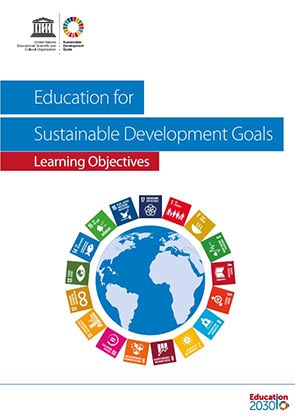
Education for Sustainable Development provides formal and informal learning opportunities which enable all students to develop the knowledge, skills, attitudes and values required to contribute to a sustainable future.
Education for Sustainable Development (ESD) equips learners across all disciplines with the knowledge, skills, attributes and values required to pursue sustainable visions of the future. Using active pedagogies learners are supported in addressing complex or ‘wicked problems’ and identifying how they can contribute to solutions that address environmental integrity, social justice and economic prosperity.
The QAA, in partnership with Advance HE, have a range of useful resources to help academic staff incorporate ESD within their curricula:
All staff and students at EHU can register to use this site: https://www.membershipresources.qaa.ac.uk/Login >>
The guidance gives advice and support on curriculum design, as well as teaching, learning and assessment approaches.
Alongside the guidance you can access a range of complementary materials including:
- a short video which answers the question “What is ESD?”
- a suite of inspiring practice guides which provide practical examples of how diverse UK institutions have successfully incorporated ESD within their curricula.
- a resource to support students to actively engage with their institution and students’ union about ESD
An excellent example of how to integrate sustainability into the curriculum is provided by Anna Moore “A planetary health curriculum for medicine https://www.bmj.com/content/375/bmj.n2385“.
Read Professor John Sandars latest post: A New Year’s Resolution: Education for the UN Sustainable Development Goals.
How can we practically put Education for Sustainable Development into action?
Education for Sustainable Development Guidance
Jointly published by QAA and Advance HE, this guidance provides a framework and guidance to help staff in UK higher education institutions incorporate Education for Sustainable Development within their curricula. It has been produced by an expert group drawn from across the sector, with the aim of supporting students from any discipline to acquire the knowledge, understanding and skills necessary to develop values and take actions to transition society towards sustainable futures.
Advance HE Members can download the full guidance ( EHU staff are members)

UNESCO provides a useful list of learning objectives for each of the 17 Sustainability Development Goals (SDG) and discusses how these can be achieved. UNESCO moving forward the 2030 Agenda for Sustainable Development is also available.
The Higher Education Academy (HEA) offers general and practical advice about teaching and learning, assessment and the learning environment. There is a useful checklist for all educators:
Questions that educators may ask themselves.
Reflecting on Sustainability/Sustainable Development
- How does education for sustainable development relate to my subject area or discipline?
- To what extent am I already covering sustainable development issues? How can I make those features more explicit?
- What types of sustainable development case studies exist within, and are applicable to, my discipline?
Engaging Students
- How can I help students develop interdisciplinary thinking and encourage them to take a holistic approach?
- If many of my students perceive sustainable development as solely or primarily an environmental issue, how can I ensure they understand the balance between society, economy and environment?
- The words ‘sustainability’ and ‘sustainable development’ do not resonate with the vocabulary commonly used in my discipline. What alternative words and concepts could I use to engage my students
The Learning Environment
- How can I provide learning opportunities that have authenticity, enabling students to relate their knowledge and skills to real-life problems, both locally and globally?
- How can I provide learning opportunities that begin to make a difference to sustainability, such as project work or service learning?

